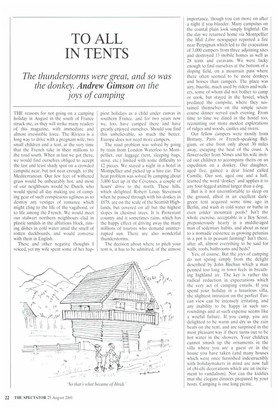TO ALL IN TENTS
The thunderstorms were great, and so was
the donkey. Andrew Gimson on the
joys of camping
THE reasons for not going on a camping holiday in August in the south of France struck me, as they will strike many readers of this magazine, with immediate and almost irresistible force. The Riviera is a long way to drive with a pregnant wife, two small children and a tent, at the very time that the French take in their millions to the road south. When at last we got there, we would find ourselves obliged to accept the last and least shady spot on a crowded campsite near, but not near enough, to the Mediterranean. Our few feet of withered grass would be unbearably hot, and most of our neighbours would be Dutch, who would spend all day making use of camping gear of such conspicuous ugliness as to destroy any vestiges of romance which might cling to the life of the vagabond, or to life among the French. We would meet our stalwart northern neighbours clad in plastic sandals in the ablutions block, rinsing dishes in cold water amid the smell of rotten duckboards, and would converse with them in English.
These and other negative thoughts I voiced, yet my wife spent some of her hap piest holidays as a child under canvas in southern France, and for two years now we, too, have camped there and have greatly enjoyed ourselves. Should you find this unbelievable, so much the better. Europe does not need more campers.
The road problem was solved by going by train from London Waterloo to Montpellier, our luggage (tent, sleeping bags, stove, etc.) limited with some difficulty to 12 pieces. We stayed a night in a hotel in Montpellier and picked up a hire car. The heat problem was solved by camping about 3,000 feet up in the Cevennes, a couple of hours' drive to the north. These hills, which delighted Robert Louis Stevenson when he passed through with his donkey in 1878, are on the scale of the Scottish Highlands, but covered on all but the highest slopes in chestnut trees. It is Protestant country and it sometimes rains, which has the happy effect of driving away the many millions of tourists who demand uninterrupted sun. There are also wonderful thunderstorms.
The decision about where to pitch your tent is, it has to be admitted, of the utmost importance, though you can move on after a night if you blunder. Many campsites on the coastal plain look simply frightful. On the day we returned home via Montpellier the Midi Libre newspaper reported a fire near Perpignan which led to the evacuation of 3,000 campers from three adjoining sites and destroyed 13 mobile homes as well as 28 tents and caravans. We were lucky enough to find ourselves at the bottom of a sloping field, on a mountain pass where there often seemed to be more donkeys and horses than campers. The place was airy, bucolic, much used by riders and walkers, some of whom did not bother to camp or cook, but stayed in the hostel, which predated the campsite, where they sustained themselves on the simple sevencourse dinner served each evening. From time to time we dined in the hostel too, recounting our more modest explorations of ridges and woods, castles and rivers.
Our fellow campers were mostly from Brittany. Paris or French-speaking Belgium, or else from only about 30 miles away, escaping the heat of the coast. A flower-seller from Nimes and his wife invited our children to accompany theirs on an expedition on a donkey. Our daughter, aged five, gained a dear friend called Camille. Our son, aged one and a half, learned the word 'donkey' and applies it to any four-legged animal larger than a dog.
But is it not uncomfortable to sleep on the ground, albeit in an excellent darkgreen tent acquired some time ago in Berlin, and wash in cold water or bathe in even colder mountain pools? Isn't the whole exercise, acceptable in a Boy Scout, preposterously hearty in a middle-aged man of sedentary habits, and about as near to a nomadic existence as growing petunias in a pot is to peasant farming? Isn't there, after all, almost everything to be said for walls, roofs, bathrooms and beds?
Yes, of course. But the joys of camping do not spring simply from the delight described by John Buchan which a man penned too long in town feels in breathing highland air. The key is rather the radical reduction in expectations which the very act of camping entails. If you spend your holiday in a luxurious villa, the slightest intrusion on the perfect Tuscan view can be intensely irritating, and any inability to be happy in such surroundings and at such expense seems like a woeful failure. If you camp, you are delighted to be warm and dry as the rain beats on the tent, and are surprised in the most pleasant way if there turns out to be hot water in the showers. Your children cannot smash up the ornaments in the villa where you are a guest or in the house you have taken (and many houses which were once furnished indestructibly with holidaymakers in mind are now full of chi-chi decorations which are an incitement to vandalism). Nor can the kiddies mar the elegant dinners prepared by your hosts. Camping is one long picnic,


























































 Previous page
Previous page